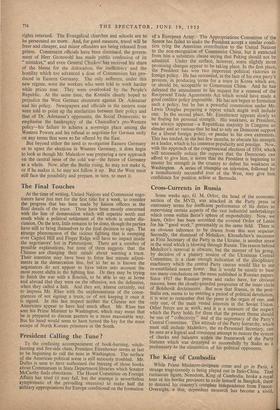Cross-Currents in Russia
Some weeks ago, G. M. Orlov, the head of the economic section of the MVD, was attacked in the Party press in customary terms for inefficient performance of his duties in supervising certain aspects of the vast industrial undertakings which come within Beria's sphere of responsibility. Now, we learn, Orlov has been accorded the coveted Order of Lenin for his " good work," presumably in the same field. There is an obvious inference to be drawn from this non sequitur. Secondly, the dismissal of Melnikov, Khrushchev's successor as First Secretary of the Party in the Ukraine, is another straw in the wind which is blowing through Russia. The reason behind Melnikov's removal is obscure, but the manner of his going, by decision of a plenary session of the Ukrainian Central Committee, is a clear enough indication of the disciplinary machinery which the central Party caucus would like to see re-established nearer home. But it 'would be unsafe to base too many conclusions on the news published in Russian papers. Since 1917 the Russian press and radio have, for obvious reasons, been the closely-guarded perquisites of the inner circle of Bolshevik doctrinaires. But now that Russia, in the post- Stalin era, seems to be entering a period of political devolution, it is wise to remember that the press is the organ of one, and only one, of the main vested interests in the Soviet Union. Other forces are at work, and it is a measure of the respect which the Party holds for them that the present theme should be one of " collectivity " and of the supremacy of the Party's Central Committee. This attitude of the Party hierarchy, which must still include Malenkov, the ex-Personnel Secretary, can be seen as a logical and consistent attempt to restore the system of checks and balances within the framework of the Party Statutes which was destroyed so successfully by Stalin as a preliminary to the elimination of his political opponents.


















































 Previous page
Previous page